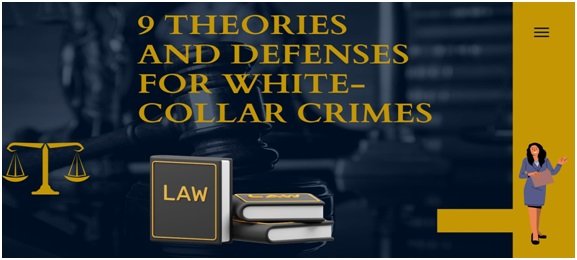9 Theories and Defenses for White-Collar Crimes

Our criminal justice systemtreats white-collar crimes and violent crimes differently. Nonviolent offenses done with the intent to steal or defraud money are often classified as white-collar crimes.
Scholars from various academic backgrounds have examined white-collar/corporate crime. In the simplest sense, white-collar offense refers to any kind of fraud performed by corporate or government employees. Taking the assistance of reliable white-collar crimes lawyers would be a wise choice here.
Table of Contents
What Is a White-Collar Crime?
White-collar crime refers to nonviolent offenses where financial gain is the driving force. White-collar criminals generally hold high-ranking business positions and earn high incomes.
Sociologist and criminologist Edwin Sutherland coined “white-collar crime” in the 1930s. He invented the term to describe “persons of respectability” who deviate. Sutherland established the Bloomington School of Criminology at Indiana State University.
Before Sutherland popularized the phrase, upper-class people were thought incapable of white-collar criminal defense. Some of the largest US firms limited Sutherland’s book, disputing this widely held view.
Why Do You Need White Collar Crimes Lawyers?
White-collar crime defendants require qualified lawyers. White-collar crimes are uncommon compared to street crimes in the US. But they usually involve vast sums of money owing to the perpetrators’ higher socioeconomic level.
You should always have an attorney on your side for many different reasons. If your white-collar criminal attorney knows more about you than you or your coworkers, they may help you escape the penalty. White-collar crimes lawyersare knowledgeable and can fight for your case regardless of your opponent. Having white-collar crimes lawyers on your side means you don’t have to utter a word throughout the investigative process.
The lawyer will make the presentation and field all of the questions on your behalf. Investigators will chat with suspects before arresting them.
They are gathering evidence to identify what happened and who’s responsible. Your answers will likely lead to further questioning from investigators.
Even worse, a single slip of the tongue may set off a cascade of inquiries, with you squarely in the middle of it all. So, it’s best to stay silent and let the white-collar crime lawyers deal with it.
What Types of White-Collar Crimes Are Out There?
1. Fraud
To steal someone’s money, fraud may refer to a wide variety of activities. One of the most popular and straightforward is the promise of a large sum of money in exchange for a little donation to the fraudster’s account.
2. Insider Trading
Financial market insider trading happens when someone with necessary, non-public knowledge trades.
3. Ponzi Scheme
Ponzi schemes, named after Charles Ponzi, are financial scams that promise significant gains. This method uses the capital from new investors to provide returns to the original investors.
4. Embezzlement
“Embezzlement” means stealing from an employer. It can range from stealing a few dollars from a cash drawer to a multimillion-dollar scheme.
5. Cybercrimes Like Identity Theft
Two of the most common types of cybercrime are identity theft and “hacking” into computer systems.
6. Money Laundering
Criminals who handle considerable sums of money need the services of money launderers. It involves transferring the money into legal businesses after moving it via many accounts.
7. Espionage
In most cases, espionage (also known as spying) is committed by well-educated, middle-class people. These individuals usually possess white-collar employment.
Overall Perspective on White-Collar Crime Theory
Both crime and its root causes are complex and multifaceted. Many different hypotheses attempt to explain why people commit crimes. Because of this, organizing criminological ideas is very challenging.
Differential Association Theory
The first significant attempt to explain criminal conduct was Sutherland’s Theory of Differential Association, a famous social learning theory.
Basics of Differential Association
- Illegal conduct is a behavioral habit. With this premise, traditional criminological theories are significantly altered.
- Acquiring criminal conduct is a social learning process between two or more people. In his theory, Sutherland argued that conversation is crucial to receiving criminal conduct. “Association” means interacting with and imitating others, according to this theory.
- The majority of criminal training takes place in close-knit social circles. Family, friends, and classmates have the most significant effect on antisocial behavior. Criminal behavior is unaffected by movies or newspapers.
- Several components of criminal conduct can be taught-.
- It may include the methods of commission, which can be complex and simple.
- Emotions, thoughts, and beliefs also take a definite course.
- Legal definitions show us the direction of motives and impulses.
- The concept of differential association is embodied in the sixth assertion.
- The timing, length, importance, and strength of a differential connection are all variables. Sutherland believed that one’s social group influences whether one becomes a criminal.
- Criminal behavior is trained much like other behaviors via association with criminal and anticriminal behaviors. This statement illustrates how learning illegal activity is like writing, drawing, and reading.
- Criminal conduct is an expression of universal wants and ideals. But they do not explain it since they are also expressed in noncriminal behavior.
Defenses for Standard White Collar Crime Theory
White-collar crimes include fraud, theft, money laundering, computer/internet crimes, and tax evasion. The criminal defense team’s approach will vary from case to case based on the situation’s specifics.
However, there are several frequent defenses used in white collar crimes cases. Standard defense methods used by white-collar crime attorneys include:
1. Lack of Intent
The prosecution of a white-collar crime requires proof of two essential aspects. First, the conduct was illegal; second, the defendant intended to perform the unlawful act.
There are cases when the defendant made a mistake and gained no material profit from the crime. Defendants could be freed if the prosecution cannot prove they committed the crime for money.
2. Lack of Knowledge
Since it is presumed that most people are aware that violent actions are prohibited by law, ignorance is seldom a valid excuse for doing one.
White-collar crimes may need coordinated efforts from several entities. An individual or group can claim ignorance of their participation in criminal activities.
3. Coercion
The defense of coercion, or being compelled to commit a crime, also applies to a white-collar crime case. If, for example, a person is coerced into committing a crime out of concern for the safety of their family, they have a valid defense in the form of coercion.
4. Identifying Flaws in the Prosecution’s Case
Federal prosecutors usually wait until they have a strong case against the defendant before taking the case to trial.
It does not imply that a prosecutor can rest easy about every case they pursue. To get a case dismissed, a white-collar criminal defense firm will look for flaws in the prosecution’s evidence and arguments. They will also refute its fundamental premises.
5. Entrapment
It is a typical justification for a white-collar offense. Law enforcement will try to set up a sting operation to catch a suspect in the act. That kind of strategy is rather typical.
The defense team may claim entrapment if they can show that the cops or informants had a role in initiating the illegal action.
6. Disability of the Mind
White-collar criminals generally know finance, banking, and technology. Your defense counsel can show that you were either too young or mentally impaired to conduct the offense you were being charged with.
7. Non-Fraudulent Statements
A defendant who has been accused of filing a fraudulent claim may try to influence the accuser’s behavior. It may happen to owe to the defendant’s opinions. The accused misconstrued the defendant’s non-fraudulent statement because it damaged his finances.
8. Intoxication
Intoxication may indicate that the defendant was not behaving deliberately. Defendants who can show they were intoxicated at the time of the offense may use this as an absolute defense. Although, they usually use it to negotiate a reduced charge or sentence.
9. Plea Agreements
If there is a mountain of evidence against the defendant, we will try to work out a deal. To avoid going to trial, the defendant here has agreed to plead guilty, but generally to less severe charges.
The prosecution may reduce the punishment if the defense can prove their client cooperated completely with them.
Conclusion
White-collar crimes may lead to jail time, property loss, probation, and community service.
If you care about your good name, liberty, and bank account, you need an experienced lawyer to assist you in building a solid case. We hope this resource helps you pursue justice for your situation, as it is yours.












